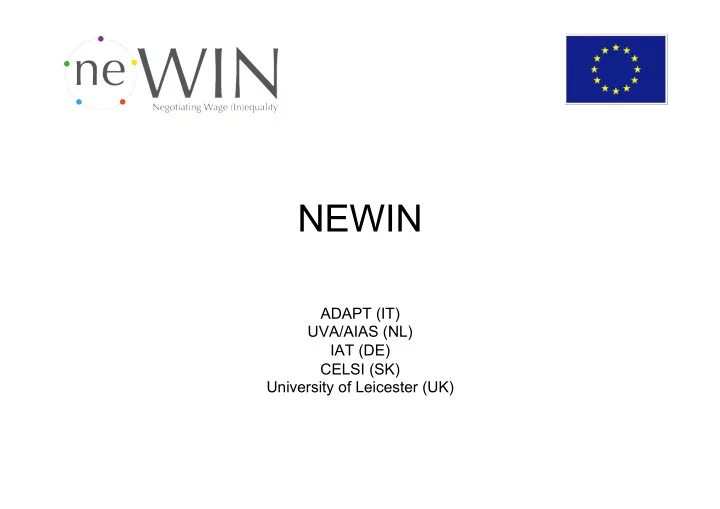

NEWIN ADAPT (IT) UVA/AIAS (NL) IAT (DE) CELSI (SK) University of Leicester (UK)
General objective • Increase social partners and policy awareness about the contribution that collective bargaining has on inequality in societies • in 5 EU countries: Germany, Italy, the Netherlands, Slovak Republic and the United Kingdom
Specific objectives • Analyse the challenges that social partners are facing concerning the issue of (growing) wage inequality at the several levels of IR • Analyse social partners ’ views on their roles in regulating wage inequalities • Analyse social partners ’ actions and strategies • Provide detailed insights into experiences and results of collective bargaining regarding (re)regulation of wages • Empirically analyse the relationship between wage dispersion and industrial relations characteristics • Disseminate and discuss lessons learned to promote transnational learning
Duration of activities • Start date: 1/12/2014 • End date: 30/11/2016 • 24 months
Cross-sectoral and multi-method approach • The project focuses on 4 sectors: – Banking – metal (automotive or electronics) – Retail (supermarket) – Education • Qualitative research /quantitative research
Qualitative research • 5 country studies will be produced, following the structure: – Literature review on wage inequality in the country – Institutional analysis on the functioning of collective bargaining in the country – Review of existing collective bargaining measures affecting wages – Results of interviews to the most representative social partners in the 4 sectors
Quantitative research • 1 quantitative report on the dispersion of wages and the relationship between various models of collective bargaining and union density, including: – Wage dispersion in the 5 countries and across the 4 sectors – Data on collective bargaining indicators – Correlations between the two above – Econometric analysis on the recent relationship between collective bargaining/union density and wage inequality
Project outputs • 5 country study reports (30-40 pp) • 1 comparative report based on country study reports (30-40 pp) • 1 quantitative report (20 pp) • 1 final report with policy recom. (40-50 pp)
Events • Kickoff (Italy) • February 2016: Midterm workshop (Amsterdam) • Between March and May 2016: National workshops (in each country) • By November 2016: Final conference (Brussels)
Recommend
More recommend